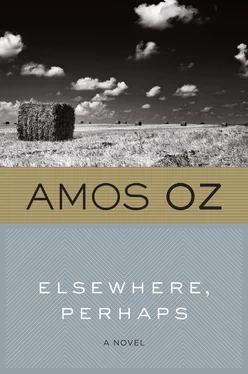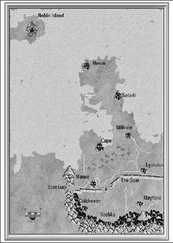"Sorry about what? What's happened?"
The rain was so sudden that, despite the rush, everyone was drenched.
On the platform, too, there was a flurry of movement. Izia Gurevitch-Gilead picked up his notes and tucked them away in his pocket.
"At this point I must stop, as it is raining," he said, but by now he had no audience.
Mundek Zohar, bent double by the downpour, added:
" Force majeure. "
Then he linked arms with the speaker to help him down off the platform, since he was not as young as he used to be.
***
When they were assembled, dripping wet, in Mundek's small room, Gerda Zohar said:
"Just imagine. Who would have thought it. Ido, take your shoes off. You'll spread mud everywhere."
Mundek Zohar remarked that he had never known it to rain on May Day in all the twenty-nine years he had lived in Israel.
"This morning there wasn't a cloud in sight," said Izia. "The rain came on very suddenly. In fact, though, it's not all that amazing. I can remember rain as late as Shavuoth."
"Don't tempt fate," said Gerda.
Ido did not say a word but made his way to the sofa, where he stretched out, resting his head on his hand.
Gerda said:
"I've put the kettle on for tea."
"My wife may be from Germany," Mundek said, "but I've taught her to make real Russian tea."
"Don't put yourselves out on my account," said Izia.
Gerda opened the built-in cupboard and took out three neatly ironed shirts, three pairs of khaki trousers, and two vests.
"You'd all better change," she said. "You're soaking wet."
Izia, uneasy, refused out of politeness. Gerda asked if he preferred to catch his death of cold. Izia replied that he didn't want to put her to any trouble. Gerda insisted that it was no trouble. Izia yielded and changed. Mundek enthused sentimentally about the tattered rags they used to wear in the good old pioneering days. There followed an exchange of memories
Izia said:
"Your pride and joy is remarkably silent."
"Sometimes he is, and sometimes he isn't," Gerda replied, and smiled at her son. Ido, however, did not return the smile. He may even have grumbled under his breath.
Mundek dropped the subject of the good old days and asked Izia for news of the wide world. Izia said that every last drop of strength would have to be mobilized for the political campaign that was imminent.
Ido was thinking ugly thoughts. He was curled up on the sofa, with his knees drawn up to his chin. A procession of images passed through his closed eyes.
Gerda served tea. She pointed to the thick white bandage that was wound round her leg from knee to ankle and explained that she was suffering from varicose veins. It's old age, she added. Izia ventured to remark that none of them was getting any younger. Even he had been suffering from certain pains. He didn't like to talk about them. What good could talking do, anyhow? The kettle boiled again. They drank their tea. Outside there was nothing to be heard except the falling rain, which had become no lighter and no heavier, but kept up its steady, ruthless pounding. Gerda closed all the windows. The drops played a monotonous tune on the glass panes. Mundek advised Izia to stay the night: it was madness to risk our rough road in such wet weather, not to mention at night. From the security point of view, too, it wouldn't be wise to leave now. Izia refused, out of politeness. Finally he yielded and agreed, and thanked his host and hostess for their kindness. Gerda said there was nothing to thank them for. On the contrary. Mundek would be only too pleased to have an opportunity to reminisce about the good old days. They had another cup of tea (all except Ido, whose father called him an "angry young man"). They decided not to have supper. It was too wet to walk across to the dining hall, and anyway Gerda had a larder full of cakes, sweets, fruit, and — of course — unlimited supplies of Russian tea.
They talked about the prices of agricultural produce. They all agreed that many ordinary kibbutzniks did not realize the importance of political power.
Mundek asked his son in passing why he didn't get a book to read. Ido said he was listening to the conversation. But he was not telling the truth. Ido was not following the conversation. He was thinking about a girl, a girl two years older than himself. Noga Harish. Noga is like me only different. She's much, much more. More what. Feminine. No. Wild. No. There's a nice word. Heady.
About Noga, yes. I like her smell. Hasia has it, too, but too strong. Exaggerated.
Isn't it good in the rain. The rain washes the earth, and the earth drinks the rain. There's a nice word, "sodden." The earth is sodden. Noga hasn't got varicose veins. When she bites her lower lip, she looks like a wolf. The wolf is a frightening animal because he is thought of as a cruel beast of prey. When it rains, the wolf runs and hides in his cave. The wolf's cave is closed and secret and warm and dark. The air then is full of strong smells. The wolf curls up and goes to sleep and isn't afraid of anything, because the wolf is a frightening animal not a frightened animal. Wolves live in lairs in the forest. The word "lair" is one of the nicest things about wolves. Under the rocks high up in the thick dense forests, those forests with the beautiful, bittersweet name "virgin forests," where no man's foot has ever trodden. Only wolves' feet and foxes' and other silent animals'. Not feet, paws. The wolf has thick gray or brown fur. Now, when it's cold and rainy, the wolves huddle together to keep warm. And the wind howls in the woods. Pine tree howls to pine tree in the wind in the dark in the wet. Noga's mother Eva is like the she-wolves. Among the pine trees. The water pours down in torrents, streams even into the lair, and what will the she-wolf do then? Where will she go?
Then the thunder. Roaring thunder. Everything trembled. I trembled. Noga trembled there. Hasia. Eva. Everything. Then something very soft. Something lean and supple. Like fur. Like a she-wolf. Like a lair in the rain flooded with quick strong little spurts, streaming through every crack. All in pitch blackness. Soft and light and floating.
When Gerda Zohar served the third round of tea, Ido, too, accepted a glass. He even volunteered to go next door to borrow a blanket for the guest. Izia Gurevitch-Gilead inquired what he was studying at school. Ido explained fully and clearly. Izia jokingly said that up to five minutes before he had thought the boy was dumb. Of course, he had only thought it as a joke. Gerda said that boys of his age were liable to sudden changes of mood without any apparent reason. Izia said that a boy who was taught by Reuven Harish was bound to be sensitive. Mundek challenged the generalization but agreed in the present instance. Gerda served savory biscuits. The guest said that it sounded like the flood outside. Mundek said that by the sound of it the rain intended to go on for ever. Gerda said that ever since she was a small child the sound of rain on the windowpanes had made her feel sad. Mundek said that the summer crops would benefit but that the orchards would suffer. At half past ten they went to bed, not before sipping a fourth round of real Russian tea.
The next day, Saturday, the second of May, the sun shone brightly in a clear blue sky. Even the mountains seemed less forbidding. The Zohars took their guest for a walk round about the kibbutz, because a wonderful spring day like this is only ever seen after rain, and also because it is good for us to foster a spiritual link with animals and plants.
A few days ago, in the early afternoon, we stood at the top of a pretty little hill and looked at the distant view of Kibbutz Metsudat Ram. We were impressed by its strictly symmetrical plan; we observed the contrast between the smiling valley and the glowering mountain range; we made a rapid tour of the kibbutz grounds and heard a brief description from Reuven Harish of the principles of life adopted by him and his fellow members.
Читать дальше












